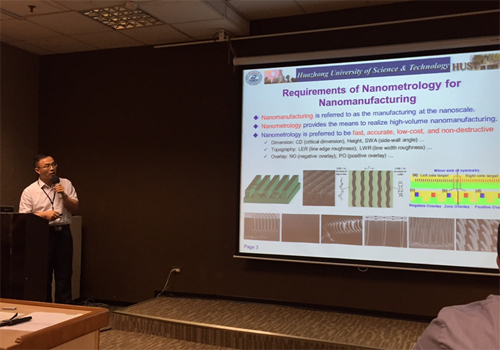From 22 to 28 Sep. 2015, Professor Shiyuan Liu, the leader of the Nanoscale and Optical Metrology (NOM) group in MSE, and associate professor Hao Jiang went to Taipei to attend the 12th International Symposium on Measurement Technology and Intelligent Instruments (ISTMII 2015) sponsored by the International Committee on Measurements and Instrumentation (ICMI). In the symposium, Prof. Liu was invited to make a special report named “Mueller matrix ellipsometry: A power tool for nanostructure metrology in manufacturing”. Prof. Liu was elected to the Council Member of ICMI, became the only new member of this committee during the last two sessions (once every two years).

In the report, Prof. Liu pointed out that high-volume-production nanomanufacturing put forward new requirements to the nanoscale metrology, i.e., fast, accurate, low-cost, and non-destruction. The Mueller matrix ellipsometer has been developed as a powerful tool which can meet the mentioned requirements for nanostructure metrology. Prof. Liu presented the basic principles for the nanostructure metrology based on ellipsometric scatterometry, and pointed out that it is essentially model-based computational metrology, which faces several basic scientific issues and key technological challenges, including the measurability, error analysis and estimation of measurement uncertainty, measurement configuration optimization, fast and accurate numerical methods for forward modeling, and fast and robust measurand reconstruction algorithms. Then, Prof. Liu presented the research works of NOM in recent years on the development of Mueller matrix ellipsometer, basic theories and key techniques of computational metrology, and exploration of the Mueller matrix ellipsometry applications in nanostructure measurement, supported by the National Natural Science Foundation of China “Theory and Methodology for Three-Dimensional Profile Measurement of Nanostructures Using Mueller Matrix Ellipsometry” and the National Instrument Development Specific Project of China “Development of A Broadband Mueller Matrix Ellipsometer”. He clarified that the ellipsometric scatterometry is particularly suitable for non-destructive, on-line, and accurate measurements during the manufacturing process of large-scale nanostructures. At last, Prof. Liu gave some prospects and recommendations on the development of nanoscale metrology in the future.
This symposium with the theme of “Measurement Technology and Intelligent Instruments” is hosted by the National Taiwan University, aiming to promote the communications and interactions of cross-strait with international teams and technology professionals in the field of precision engineering and nanotechnology. The participating scholars discussed several key issues in the field of measurement technology and intelligent instruments, such as measurement requirement, technology development trends, development goals, and the technological frontier. Based on these depth discussions and communications, the scholars draw the future for the development in the field of measurement technology and intelligent instruments. After the conference, Prof. Liu and Jiang are invited to visit laboratories in National Taiwan University and National Taipei University of Technology, and made extensive exchanges with the researchers.